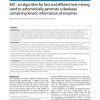1585 search results - page 39 / 317 » Creating a Knowledge Base of Biological Research Papers |
104
click to vote
BMCBI
2010
14 years 12 months ago
2010
Background: The amount of available biological information is rapidly increasing and the focus of biological research has moved from single components to networks and even larger ...
106
click to vote
BMCBI
2007
14 years 12 months ago
2007
Background: Innovative extensions of (M) ANOVA gain common ground for the analysis of designed metabolomics experiments. ASCA is such a multivariate analysis method; it has succes...
105
click to vote
GECCO
2004
Springer
15 years 5 months ago
2004
Springer
To create a realistic environment, some simulations require simulated agents with human behavior pattern. Creating such agents with realistic behavior can be a tedious and time con...
100
click to vote
IJMMS
2007
14 years 11 months ago
2007
: In information systems that support knowledge-discovery applications such as scientific exploration, reliance on highly structured ontologies as data-organization aids can be lim...
IJCNN
2000
IEEE
15 years 4 months ago
2000
IEEE
KBCC is an extension of the cascade-correlation algorithm that treats functions encapsulating prior knowledge as black-boxes which, like simple sigmoidal neurons, can be recruited...


